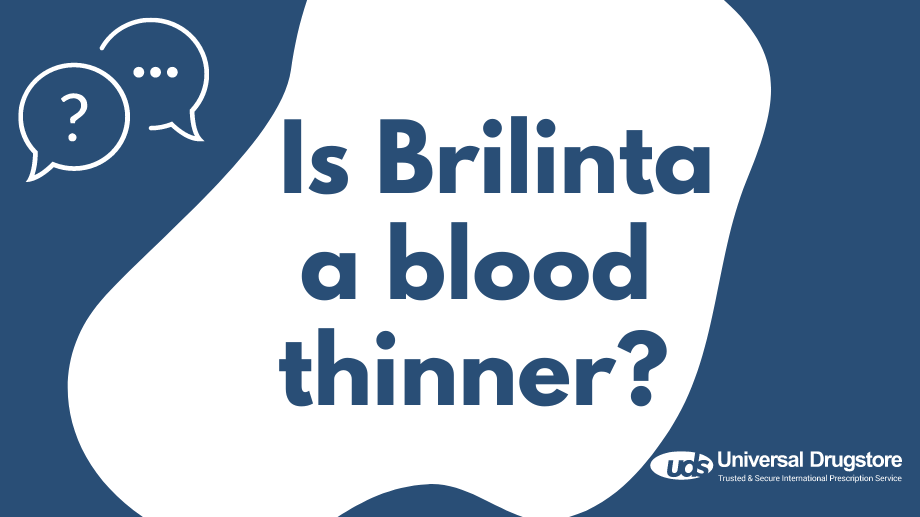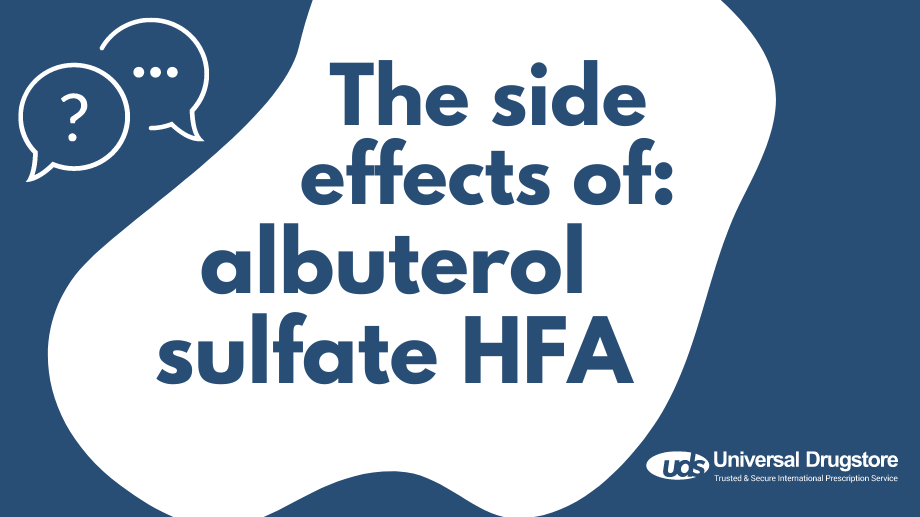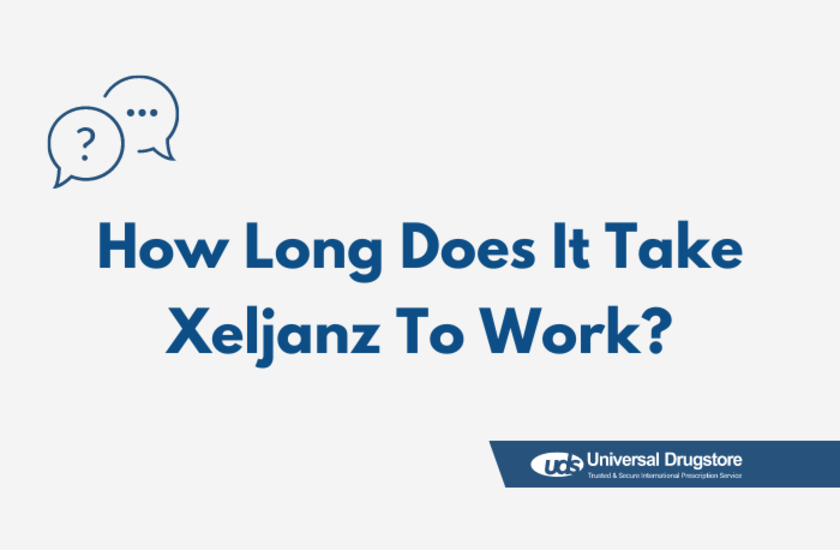Blood thinners are medications that prevent blood clot formation. They do not dissolve clots that you already have but can stop them from growing bigger. It is essential to treat blood clots as they can lead to heart attacks, strokes, and death. You may need a blood thinner if you have certain cardiovascular or blood vessel conditions, an abnormal heart rhythm (atrial fibrillation), heart surgery including stent placements, and certain heart defects you are born with.
There are different types of blood thinners, including anticoagulants such as warfarin and antiplatelets such as clopidogrel and Brilinta (ticagrelor). Brilinta is an oral blood thinner that is manufactured by AstraZeneca. It is a tablet that is typically taken twice a day to help prevent stroke and heart attacks in certain adults.
Keep reading as we discuss what Brilinta treats, what you shouldn’t take with it, and other important information you need to know.
Brilinta FAQs
What is Brilinta?
Brilinta (ticagrelor) is a platelet inhibitor that is FDA-approved to reduce your risk of heart attack (myocardial infarction), stroke, and death with acute coronary syndrome (ACS), chest pain (angina), or a prior heart attack. It can be used to reduce your risk of blood clots following a stent in blood vessels in your heart as well as reduce your risk of a first heart attack or stroke from coronary artery disease (CAD) if you are at a higher risk for these events. Brilinta is also approved to reduce your risk of stroke from certain conditions such as acute ischemic stroke or high-risk transient ischemic attack (TIA).
How does Brilinta work?
Brilinta helps prevent platelets from sticking together to form dangerous blood clots, which increases blood flow to your heart and reduces your risk of a heart attack or stroke.
What are the most common side effects of Brilinta?
The most common possible side effects of Brilinta seen in clinical trials include:
-
Shortness of breath
-
Nosebleeds and other minor bleeding
-
Diarrhea
-
Nausea
-
Dizziness
-
Slow heart rate
Brilinta can sometimes cause serious side effects such as:
-
Severe, life-threatening allergic reactions, including anaphylaxis (hives, swelling of your tongue or throat, and shortness of breath)
-
Increased risk of serious bleeding, especially if you take Brilinta with blood thinners or anticoagulants
-
Liver damage
These are not all of the possible side effects of Brilinta. You should always seek medical advice from your healthcare professional for any questions or concerns about your medical condition or treatment. Read all medication guides or drug information sheets that come with this medication. You can report side effects to FDA at 1-800-FDA-1088 or www.fda.gov/medwatch.
Are there any drug interactions with Brilinta?
When Brilinta is taken with other drugs, it can change how Brilinta works or make some side effects more likely or severe. You should ask your healthcare provider if any of the prescription drugs, over-the-counter (OTC) drugs, vitamins, or supplements you take may interact with Brilinta, including:
-
Cholesterol drugs, including lovastatin and simvastatin
-
Antifungal drugs, including ketoconazole, voriconazole, and itraconazole
-
Anticonvulsants, including phenytoin, carbamazepine, and phenobarbital
-
Drugs used to treat HIV, including atazanavir and ritonavir
-
Certain antibiotics, including clarithromycin
-
Antiplatelet drugs such as clopidogrel
-
Warfarin
-
Ibuprofen
-
Naproxen
-
Digoxin
-
Rifampin
-
Nefazodone
What are the contraindications for taking Brilinta?
Brilinta should not be taken if you have a history of bleeding inside your skull, an active bleed, or known hypersensitivity to ticagrelor or any inactive ingredient in this product.
Brilinta also carries a boxed warning from the FDA about bleeding risks:
-
Like other antiplatelet medications, Brilinta may cause severe and sometimes fatal bleeding. This is why you should not take Brilinta if you have active bleeding or a history of bleeding inside your skull.
-
You should not begin Brilinta if you are having urgent coronary artery bypass graft surgery.
-
Any bleeding should be managed without stopping Brilinta. Stopping this medication can increase your risk of cardiovascular (heart) events such as heart attack and stroke.
-
You should avoid a maintenance dose of aspirin over 100 mg a day as it may lower how well Brilinta works.
What should you tell your doctor before starting Brilinta?
Before starting Brilinta, be sure your healthcare provider is aware of all your medical conditions, including:
-
An active bleed or signs of severe bleeding such as black stools, red, pink, or brown urine, or coughing up blood or vomit that looks like coffee grounds
-
Heart disease, high blood pressure, or other heart problems
-
Liver disease
-
You take more than 100 mg of aspirin per day
-
Are pregnant, plan on becoming pregnant, or are breastfeeding
What should you avoid when taking Brilinta?
You should not drink grapefruit juice while taking Brilinta. It can block one of the liver enzymes used to break down Brilinta which can increase your risk of bleeding and other complications. You should also avoid activities that can increase your chance of injury and bleeding. Use caution to prevent bleeding while brushing your teeth and shaving as well. Do not take medications for fever, pain, and swelling without discussing it with your healthcare provider.
One thing you do not have to avoid or limit is green leafy vegetables which you do if you take warfarin. You can eat as much spinach, broccoli, kale, or other vitamin K-rich food as you like.
What is the recommended dosage of Brilinta?
The dosage and duration of treatment with Brilinta will depend on several factors including the condition being treated and the other medications you are taking.
For a history of heart attack or ACS, you will start with a 180 mg loading dose of Brilinta. After the loading dose, you will take a 90 mg tablet 2 times a day for the first year. After a year, you will then start 60 mg of Brilinta 2 times a day.
For coronary artery disease with no prior heart attack or stroke, you will take Brilinta 60 mg 2 times a day.
For acute ischemic stroke, you will start with a 180 mg loading dose of Brilinta. After the loading dose, you will take 90 mg 2 times a day for a maximum of 30 days.
Use Brilinta to treat these conditions with 75 mg to 100 mg daily of aspirin.
Related medications
Sources
-
Brilinta Package Insert: https://den8dhaj6zs0e.cloudfront.net/50fd68b9-106b-4550-b5d0-12b045f8b184/565ceafd-fbe3-4573-9c39-19280af566ec/565ceafd-fbe3-4573-9c39-19280af566ec_viewable_rendition__v.pdf
-
National Library of Medicine: https://www.ncbi.nlm.nih.gov/pmc/articles/PMC3474441/
-
Brilinta HCP: https://www.brilintahcp.com/
-
Medscape: https://reference.medscape.com/drug/brilinta-ticagrelor-999674
-
Prescriber’s Digital Reference: https://pdr.net/drug-summary/Brilinta-ticagrelor-64









